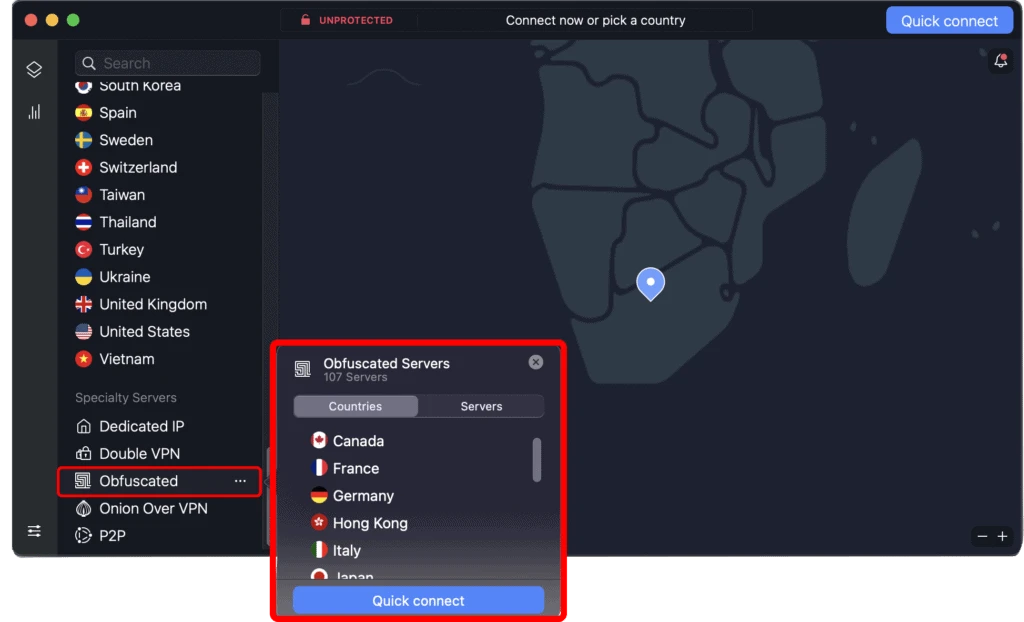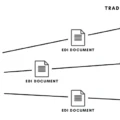Obfuscated servers (also known as “scramble” or “stealth” servers) are a type of virtual private network (VPN) that allows users to bypass firewalls and access the internet securely and anonymously. By using a combination of encryption, port shifting, and other techniques, obfuscated servers make it difficult for firewalls to detect and block VPN traffic. This makes them an important tool for anyone looking to access the internet securely from countries with restrictive internet policies.
When you connect to an obfuscated server, your connection is encrypted using the same security protocols as any other type of VPN connection. However, obfuscated servers also use additional techniques to make sure that your connection can’t be easily detected or blocked by firewalls.
One common technique used by obfuscated servers is port shifting. This involves sending your encrypted data through an alternate port on your computer that is not usually used for web traffic. For example, instead of sending data through the usual port 80 (HTTP), the obfuscation protocol might send data through port 8080 (HTTPS). This makes it harder for firewalls to detect and block your connection because they are not expecting traffic on these ports.
Another technique used by some obfuscation protocols is packet fragmentation. This involves splitting up large packets of data into smaller ones in order to make it harder for firewalls to identify and block them. By fragmenting packets, obfuscation protocols can help ensure that your connection remains secure even when passing through restrictive firewalls.
Obfuscated servers are a great tool for anyone who lives or travels in countries with restrictive internet policies or who wants to bypass corporate or school firewalls without raising suspicion. By making it more difficult for firewalls to detect and block VPN traffic, obfuscation protocols allow you to access websites and services that would otherwise be blocked without having your activity detected or flagged as suspicious.
In addition, some services provide extra features like split tunneling which allow you to choose which applications should use the obfuscation protocol and which should not, giving you even greater control over how your traffic is handled by restrictive networks.
Overall, if you need secure access to the internet in countries with restrictive online policies or want more control over how your traffic is handled by corporate or school networks, then an obfuscation protocol is definitely worth considering. With its added security measures, an obfuscating server can give you peace of mind while browsing online so that you can enjoy unrestricted access wherever you go!

Using Obfuscated Servers
Using obfuscated servers is a way to bypass certain firewalls that block VPN traffic. To use obfuscated servers on Windows, go to the Settings menu (cog icon on the top right). On the left side menu, find Advanced settings and enable/disable the Obfuscated Servers (OpenVPN) option. Once enabled, you can connect to any of the available obfuscated servers.
Obfuscation technology scrambles your VPN data so that it’s harder for your network administrator or ISP to identify it as VPN traffic. This means you can get around restrictive firewalls and unblock websites that would otherwise be inaccessible in your region.
The Obfuscation of OpenVPN
OpenVPN obfuscate is a feature that can be enabled in OpenVPN configurations to hide the fact that you are using OpenVPN. When obfuscate is enabled, the traffic sent through the VPN looks like regular internet traffic, so firewalls and gateways won’t be able to detect that it is OpenVPN traffic. This makes it easier to bypass VPN blocks and access content that would otherwise be restricted. However, it’s important to note that using obfuscation does not guarantee anonymity or privacy; other security measures should also be taken for this purpose.
The Purpose of Obfuscated Servers
Obfuscated servers are an advanced form of Virtual Private Network (VPN) that provide users with the ability to mask their online activity. When connected to an obfuscated server, your Internet Service Provider (ISP) will not be able to detect that you are using a VPN. Furthermore, obfuscated servers make it possible for users to access VPN services in environments that have particularly strong internet censorship, such as China and other countries with restrictive internet policies.
An obfuscated server works by encrypting your data before it leaves your device and routing it through a secure tunnel so that only the destination server can decrypt and read it. This ensures that any third-party attempting to monitor your traffic will be unable to see where you are going or what data you are transferring. Additionally, obfuscation also helps hide the fact that you’re using a VPN in the first place, allowing you to bypass firewalls and access restricted websites with ease.
The Benefits of Obfuscation
The purpose of obfuscation is to make it harder for someone who is not authorized or knowledgeable about a given system or process to understand or access it. Obfuscation can be used to protect data from being accessed or modified by malicious actors, to prevent reverse engineering of software code, and to ensure the security and privacy of confidential information. It is also used as a way to safeguard intellectual property by making it difficult for others to copy or replicate a piece of software. Additionally, obfuscation can be used as a form of digital camouflage, making it difficult for an adversary to locate and identify a particular target among the many available systems on the internet.
The Impact of Obfuscated Servers on Performance
No, obfuscated servers are not necessarily slower than other types of VPN servers. In fact, they can provide a better user experience with improved security and privacy features that are not available with other VPN solutions. Depending on your connection and the server location, you may even experience faster speeds when connecting to an obfuscated server. Obfuscation also helps protect your data from Deep Packet Inspection (DPI) and other forms of internet traffic analysis that can slow down your connection. Additionally, some obfuscated servers may be configured to prioritize certain kinds of traffic, such as gaming or streaming services, which can improve overall performance and speed.

Source: cloudcomputing-news.net
Conclusion
In conclusion, obfuscated servers can be a useful tool for bypassing VPN blocks by hiding OpenVPN traffic from firewalls or gateways. This can allow users to access content that may otherwise be blocked. It is important to note, however, that while obfuscating OpenVPN traffic can help bypass restrictions, it also has some potential security implications. Therefore, it is important to weigh the pros and cons of using obfuscated servers before enabling them.








